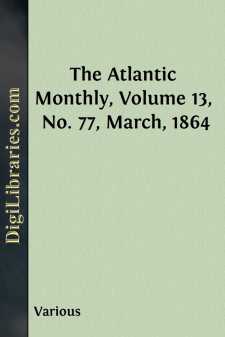Categories
- Antiques & Collectibles 13
- Architecture 36
- Art 48
- Bibles 22
- Biography & Autobiography 813
- Body, Mind & Spirit 142
- Business & Economics 28
- Children's Books 15
- Children's Fiction 12
- Computers 4
- Cooking 94
- Crafts & Hobbies 4
- Drama 346
- Education 46
- Family & Relationships 57
- Fiction 11828
- Games 19
- Gardening 17
- Health & Fitness 34
- History 1377
- House & Home 1
- Humor 147
- Juvenile Fiction 1873
- Juvenile Nonfiction 202
- Language Arts & Disciplines 88
- Law 16
- Literary Collections 686
- Literary Criticism 179
- Mathematics 13
- Medical 41
- Music 40
- Nature 179
- Non-Classifiable 1768
- Performing Arts 7
- Periodicals 1453
- Philosophy 64
- Photography 2
- Poetry 896
- Political Science 203
- Psychology 42
- Reference 154
- Religion 513
- Science 126
- Self-Help 84
- Social Science 81
- Sports & Recreation 34
- Study Aids 3
- Technology & Engineering 59
- Transportation 23
- Travel 463
- True Crime 29
The Atlantic Monthly, Volume 13, No. 77, March, 1864
by: Various
Categories:
Description:
Excerpt
I can see the excitement which this title arouses as it is flashed across the sierras, down the valleys, and into the various reading-rooms and parlors of the Golden City of the Golden State. As the San Francisco "Bulletin" announces some day, that in the "Atlantic Monthly," issued in Boston the day before, one of the articles is on "The Queen of California," what contest, in every favored circle of the most favored of lands, who the Queen may be! Is it the blond maiden who took a string of hearts with her in a leash, when she left us one sad morning? is it the hardy, brown adventuress, who, in her bark-roofed lodge, serves us out our boiled dog daily, as we come home from our water-gullies, and sews on for us weekly the few buttons which we still find indispensable in that toil? is it some Jessie of the lion-heart, heroine of a hundred days or of a thousand? is it that witch with gray eyes, cunningly hidden,—were they puzzled last night, or were they all wisdom crowded?—as she welcomed me, and as she bade me good-bye? Good Heavens! how many Queens of California are regnant this day! and of any one of them this article might be written.
No, Señores! No, Caballeros! Throng down to the wharves to see the Golden Era or the Cornelius's Coffin, or whatever other mail-steamer may bring these words to your longing eyes. Open to the right and left as Adams's express-messenger carries the earliest copy of the "Atlantic Monthly," sealed with the reddest wax, tied with the reddest tape, from the Corner Store direct to him who was once the life and light of the Corner Store, who now studies eschscholtzias through a telescope thirty-eight miles away on Monte Diablo! Rush upon the newsboy who then brings forth the bale of this Journal for the Multitude, to find that the Queen of California of whom we write is no modern queen, but that she reigned some five hundred and fifty-five years ago. Her precise contemporaries were Amadis of Gaul, the Emperor Esplandian, and the Sultan Radiaro. And she flourished, as the books say, at the time when this Sultan made his unsuccessful attack on the city of Constantinople,—all of which she saw, part of which she was.
She was not petite, nor blond, nor golden-haired. She was large and black as the ace of clubs. But the prejudice of color did not then exist even among the most brazen-faced or the most copper-headed. For, as you shall learn, she was reputed the most beautiful of women; and it was she, O Californians, who wedded the gallant prince Talanque,—your first-known king. The supporters of the arms of the beautiful shield of the State of California should be, on the right, a knight armed cap-à-pie, and, on the left, an Amazon sable, clothed in skins, as you shall now see.
Mr. E. E. Hale, of Boston, sent to the Antiquarian Society last year a paper which shows that the name of California was known to literature before it was given to our peninsula by Cortés. Cortés discovered the peninsula in 1535, and seems to have called it California then. But Mr. Hale shows that twenty-five years before that time, in a romance called the "Deeds of Esplandian," the name of California was given to an island "on the right hand of the Indies." This romance was a sequel, or fifth book, to the celebrated romance of "Amadis of Gaul." Such books made the principal reading of the young blades of that day who could read at all. It seems clear enough, that Cortés and his friends, coming to the point farthest to the west then known,—which all of them, from Columbus down, supposed to be in the East Indies,—gave to their discovery the name, familiar to romantic adventurers, of California, to indicate their belief that it was on the "right hand of the Indies." Just so Columbus called his discoveries "the Indies,"—just so was the name "El Dorado" given to regions which it was hoped would prove to be golden. The romance had said, that in the whole of the romance-island of California there was no metal but gold. Cortés, who did not find a pennyweight of dust in the real California, still had no objection to giving so golden a name to his discovery.
Mr. Hale, with that brevity which becomes antiquarians, does not go into any of the details of the life and adventures of the Queen of California as the romance describes them....












